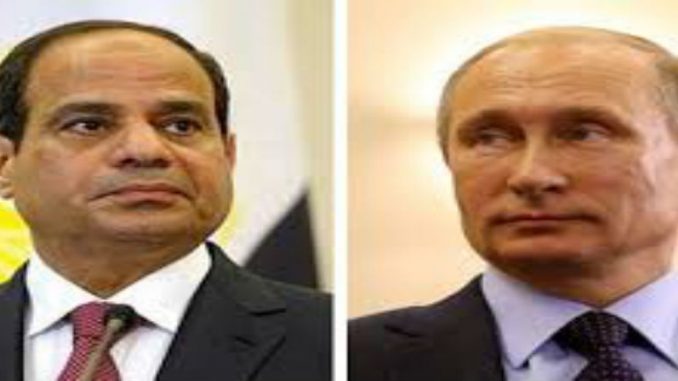
For the first time since al-Sisi reached power after a military coup he led against Mohamed Morsi, the Egyptian-Russian relations are criticized on the Egyptian media.
Last year, the Egyptian-Russian relations have flourished as Egypt’s relations with Saudi Arabia – its major Gulf financial supporter – declined.
The Egyptian regime supported Russia’s stance in the United Nations regarding the Syrian crisis when it voted in favor of the Russian resolution despite its divergence from other Arab countries, which greatly criticized the Egyptian regime.
As a result, Saudi Arabia halted its oil supply to Egypt which strengthened its relations with Russia on both the commercial and military levels. On the commercial level, Egypt opened its market widely to the Russian imports in an unprecedented way. Egypt also allowed wheat imports from Russia after it withdrew from its zero ergot policy when a trade dispute occurred between the two countries.
Al-Ahram Weekly, an Egyptian state-owned newspaper, criticizes for the first time the Egyptian-Russian relations in an article by Nader Noureddin titled, “Russia’s failures on Egypt”.
The article criticized the Egyptian Russian commercial relations especially the wheat trade.
In fact, Egypt imports 11 million tons of its total imports of wheat per year at a price of $200 per ton, meaning that Egypt pays Russia $2.2 billion a year for wheat alone. Moreover, the North African country also imports yellow maize and edible oils from Russia and Ukraine.
Last year, the country imported 8.5 million tons of maize from Russia, in addition to its imports of soy and sunflower oils, which means that Egypt pays Russia at least another $2 billion a year for these goods, making Egypt’s volume of trade with Russia worth about $5 billion a year.
According to the article, “Russia would lose a lot if Egypt decided to diversify its sources of wheat, maize, edible oils and fish, as it did earlier with US imports. This should have made Russia keener on trade with Egypt, as the balance is in Russia’s favor.”
“Egypt’s balance of trade with Russia is massively in Russia’s favor, yet Russia seems unwilling to trade fairly with Egypt,”according to the article.
However, the state-owned newspaper said that the opposite has been the case. “When Egypt decided to import ergot-free wheat last summer, Russia rejected the decision and stopped importing vegetables and fruit from Egypt, trade worth some $250 million a year.”
It added that Egypt’s reaction to this decision should have been stronger, but unfortunately under the pressure of importers and other beneficiaries the minister of supply, lacking the necessary knowledge of global trade, approached the prime minister who permitted imports of wheat infected with the ergot fungus from Russia to continue.
“Egypt fell under Russian pressure and continued to import ergot-infected Russian wheat despite the Russian measures taken against Egypt after the downing of the Russian plane over Sinai in 2015. Russian flights were halted, drying up the supply of Russian tourists to Egypt,” said al-Ahram weekly.
The article also threatened saying that Russia seems to have forgotten how eager other countries, including Australia, the US, Canada, Argentina, Romania and Ireland, have been to access Egyptian markets.
It added ,”Trade with these suppliers would eliminate the Russian intransigence and Russia’s unjustified reluctance to repeal the suspension of imports from Egypt. It would end its insistence on unnecessary inspections of vegetable and fruit farms in Egypt.”
“Russia is refusing to apply the principle of reciprocity. Perhaps the late president Anwar A-Sadat was right when he said that Russian policy was unfair and arrogant,”according to al-Ahram weekly.
In the end of the article it stated that in commercial relations having to do with the trade in food Egypt should lead and Russia should follow, and it should take into consideration the interests of the Egyptian people just as Egypt takes into account the interests of the Russian people. “If Russia does not improve its relations with Egypt, Egypt will not be able to achieve satisfactory relations with Russia either.”
Although the article focused on the trade and commercial relations between Egypt and Russia, however, we can’t undermine the political motives and insights behind the article especially that the rapprochement between both countries came as a result of the former U.S policy towards Egypt during Obama administration from one side and the political deadlock between Egypt and its Gulf partners over some regional issues from the other side.
But now the situation is different for two reasons.
First, the new U.S administration is strengthening its ties to al-Sisi regime, offering unwavering support to Egypt in the light of counter-terrorism and security cooperation.
During al-Sisi’s visit to Washington this month, President Donald Trump told his Egyptian counterpart that U.S. support for his country is unwavering.
Trump said,”You have a great friend and ally in the United States and in me.”
Trump also said as he sat beside al-Sisi in the Oval Office,”We agree on so many things.”He added, “I just want to let everybody know in case there was any doubt that we are very much behind al-Sisi. He’s done a fantastic job in a very difficult situation. We are very much behind Egypt and the people of Egypt. The United States has, believe me, backing, and we have strong backing.”
U.S. and Egypt soared under the former administration of Barack Obama, which admonished Cairo for its rights abuses following the military overthrow of Egypt’s first democratically elected President Mohammed Morsi.
In 2013,U.S. suspended military aid to Egypt before resuming it two years later, but Obama never extended an invitation to the Egypt’s military dictator after he assumed office in 2014 amid continued human rights violations.
Moreover, during Obama administration, “The State Department’s human rights report accuses Sisi’s government of stifling basic freedoms and enforcing its repression through torture, the disappearances of critics, and arbitrary arrests and killings.”
The second reason, the Egyptian Saudi have improved recently, in the light of the U.S policy in the region that seeks to revive its relations with its traditional allies.
Trump work on establishing an Arab Sunni alliance from U.S traditional client states in the Middle East against Iran?
Days ago the Time wrote,”There has been talk of deeper U.S. involvement in the Saudi-led coalition’s fight against Shiite rebels in Yemen, with Egypt possibly being urged to contribute forces.”
In this context, signs of reconciliation have recently appeared between Egypt and Saudi Arabia when media reports cited the Egyptian Petroleum Ministry saying that Saudi Arabian state oil company Aramco will resume oil product supply to Egypt some six months after halting oil shipments suddenly. In addition, Al-Sisi visited Saudi Arabia this week to patch up the rift between the two countries.



